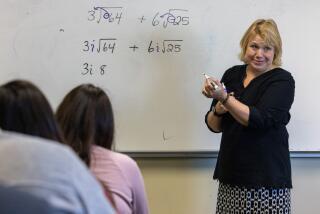Fewer Students Taking Classes in Computers
- Share via
BOSTON — College students have stopped flocking to computer science programs after learning that job prospects are not as bright and that the field is more difficult than they had thought, university officials say.
“They found that they had to take calculus, they had to take physics. It’s not a video-games major,” John Rice, chairman of Purdue University’s department of computer science, said in an interview.
“Five years ago, computers looked like they were the land of good money and easy opportunity,” said Paul Kalaghan, dean of the College of Computer Science at Northeastern University.
“I think today people understand it’s a scientific discipline. Students found it was more difficult, that the mathematical rigor was large. It’s not an easy business, really, when you couple that to the negative press the computer industry is getting.”
Drop in Enrollment
The industry is concerned about the drop in enrollment, said Dev Glaser, college recruitment manager for Digital Equipment Corp.
“I see it reducing the applicant pool,” she said. “There certainly is going to be a need for more and better technical talent in the high-tech industry.”
A survey of 552 colleges by UCLA found that about 1.6% of the freshmen who entered college last fall wanted to major in computer science. That compared to 2.1% in 1985 and 4% in 1982.
No enrollment figures were available, according to the Chronicle of Higher Education, which supplied the UCLA figures.
“For a long time it was a fairly specialized, technical field,” said Jay Nievergelt, chairman of the department of computer science at the University of North Carolina at Chapel Hill. “Then five years ago, personal computers hit the home and everybody thought you had to be a student in computer science. It was a fad.”
40% Fewer Students
At Northeastern, the size of the 5-year-old computer science program’s freshman class dropped 40% to 120 students last fall from the previous autumn, Kalaghan said.
“When we started, we had upwards of 300 freshmen come in,” he said.
Enrollment in UNC’s computer science program has dropped by half during the last few years, from a high of about 100 students a year, Nievergelt said.
However, enrollment in graduate computer science courses at UNC is climbing, and job prospects are not as dim as some might think despite the continuing computer industry depression, he said.
Not all universities are experiencing declines in computer science enrollments.
At Massachusetts Institute of Technology, the number of majors in the field has remained about constant during the last decade, said Joel Moses, chairman of the department of electrical engineering and computer science. About 10% of MIT’s 1,000 undergraduates are enrolled in computer science.
Some computer science professors said they think that the declining enrollment is a healthy trend.
“I think it’s an excellent development,” Nievergelt said. “There was an unreasonably high flooding of computer science curriculums, and fortunately that is evening out now.”
More to Read
Sign up for Essential California
The most important California stories and recommendations in your inbox every morning.
You may occasionally receive promotional content from the Los Angeles Times.










